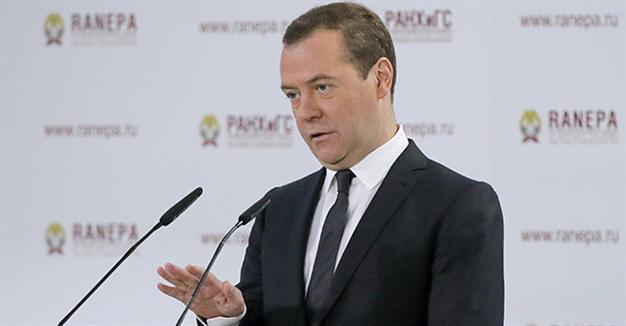Russian PM: We must be ready for worst case economic scenario
MOSCOW - Reuters

Russia's Prime Minister Dmitry Medvedev delivers a speech during a session of the Gaidar Forum 2016 'Russia and the World: Looking to the Future' in Moscow, Russia, January 13, 2016. REUTERS/Maxim Shemetov
Russian Prime Minister Dmitry Medvedev said on Jan. 13 his country needed to be ready for the worst case economic scenario amid oil plunge, but said the situation for now was manageable.Speaking at an economic forum in Moscow, Medvedev said the country needed to steel itself for tough times.
“One needs to prepare for the worst scenario,” he said.
Medvedev said the budget would need to be revised if oil prices fell further. But he also said the situation was manageable given Russia’s existing cash reserves.
“New realities” including the possibility that oil prices will remain low for a prolonged period will force Russia to take hard decisions about government spending, its finance minister.
Anton Siluanov warned the country’s budget would only balance at an oil price of $82 per barrel, well in excess of the $50 per barrel assumption used for this year’s calculations, let alone the $30 per barrel near which oil is currently trading. Some forecasters have predicted crude, Russia’s major export and main source of revenues, could fall to $20 per barrel or lower.
Although he said oil prices could start to recover in the second half of the year, Siluanov told the annual Gaidar Forum in Moscow that the 2016 budget should be revised according to a lower assumed average oil price of $40 per barrel.
“Our task is to adapt our budget to the new realities,” Siluanov said.
“Our budget will be balanced when the price is $82 per barrel so there are still a lot of decisions to be made when it comes to budget policy,” he said.
Russia’s Central Bank outlined a “risk scenario” last month under which oil prices would stay at around $35 for three years.
Siluanov said last year’s budget deficit was around 2.6 percent of gross domestic product, slightly lower than forecast, but warned that did not mean Russia had adapted to an era of cheap oil.
This year’s budget envisages a deficit of 3 percent of GDP, assuming the oil price averages $50 per barrel.
Oil prices tumbled again on Jan. 12 with U.S. crude diving briefly below $30 a barrel, taking down energy shares and undercutting a rally in stocks.
Siluanov said the first steps toward adjusting spending had been taken, after the government ordered ministries to find 10 percent cuts in “non-protected items” of expenditure.
Officials earlier told Reuters that the planned cuts had been approved by the government last month, but would exclude areas such as public sector pay and pensions.
The finance ministry, which typically emphasizes the need for fiscal caution, is likely to face resistance to spending cuts from other government departments as it did last year.
Economy Minister Alexei Ulyukayev also warned that Russia needed to brace for a long period of low commodity prices.
“I am convinced that the period of low commodity prices will be protracted,” he told the forum.
“One needs to fear that there will be (an oil price) of $20 or $15. By the logic of markets the bigger the fall today, the larger the rebound tomorrow, and this isn’t the biggest risk.
“The biggest risk is that there will be low prices for a long time -- that is for years, for decades,” Ulyukayev said.
















